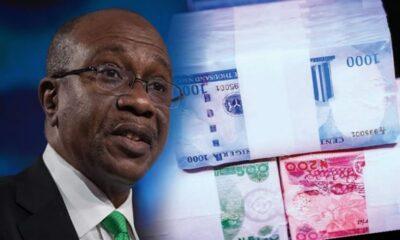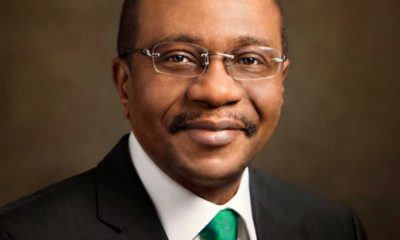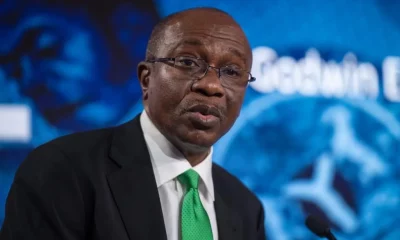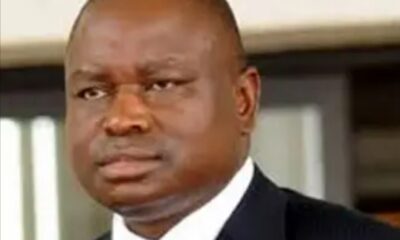Business
Inflation Rose 67 Times Under Emefiele, Says Report
Published
11 months agoon
By
Editor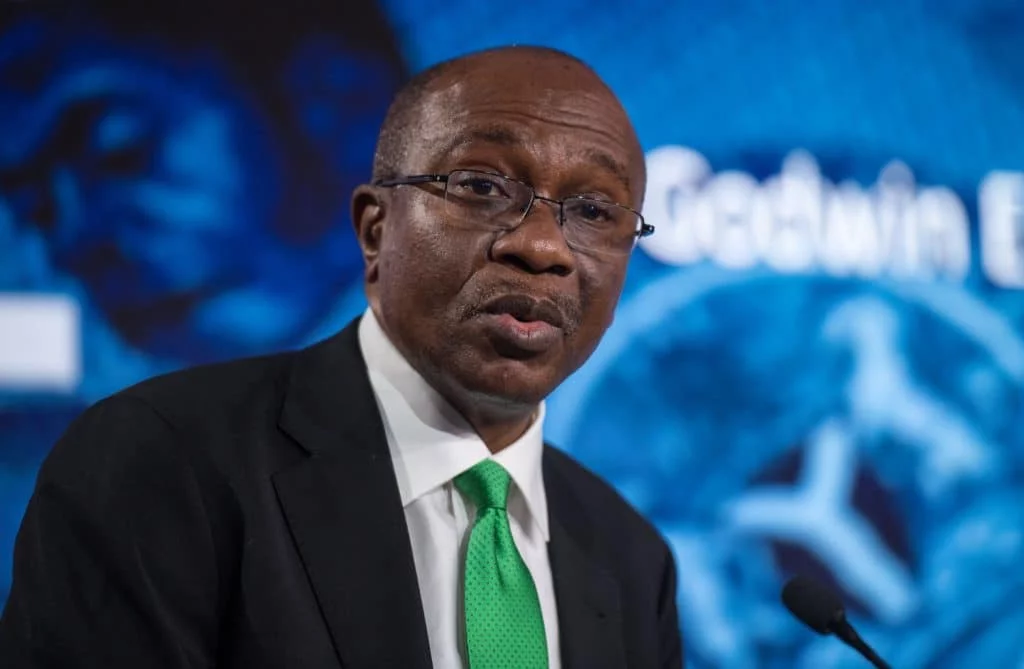
Nigeria’s inflation rate rose not less than 67 times since June 2014, according to findings by The PUNCH.
Analysis of the Inflation Rate data provided by the Central Bank of Nigeria also showed that the consumer price index was 8.2 per cent in June 2014 when the suspended CBN Governor, Godwin Emefiele, took office.
However, the country currently struggles with an inflation rate of 22.22 per cent as of April 2023. The inflation rate rose by 0.03 per cent to 22.41 per cent in May, the highest rate in 17 years.
This means that inflation rose by 14.02 percentage points while Emefiele ran the affairs of the apex bank.
A breakdown of the number of times inflation rose showed that it rose thrice between June and December 2014.
By 2015, inflation rose 10 times, except in July and October of that year.
Inflation rate became worsened in 2016 as Nigeria hit a double-digit figure of 11.38 per cent in February of that year, and inflation was on the rise throughout the year, rising 12 times.
The economy entered a recession in 2016, the first one under the suspended CBN boss.
The situation improved in 2017 as inflation only rose in July. However, it recorded different rates of decline in the same year.
The improvement was almost maintained in 2018 but inflation rose four times during the year, specifically in August, September, November and December.
By 2019, inflation rose six times, indicating Nigerians were paying more for their purchases.
READ ALSO: Inflation Hits 18yr High at 22.4%, To Surpass 23% This Month
Nigeria suffered another recession in 2020 as the COVID-19 pandemic adversely affected economical activities.
In the same year, inflation was on the rise from 12.13 per cent in January to 15.57 per cent in December.
The situation improved slightly in 2021 as inflation rose four times that year, precisely in January, February, March and December.
However, the improvement faded in 2022 as inflation rose 10 times except in January and December.
By the end of 2022, inflation had risen 63 times under the detained CBN apex bank boss.
The PUNCH further observed that inflation has been on the rise throughout 2023, from 21.82 per cent in January to 22.22 per cent in April.
This overall increase occurs despite the tightening monetary policies of the Central Bank of Nigeria to curb inflation.
Last year, the apex bank decided to continuously hike interest rates as well as introduce the naira redesign policy to control the amount of cash in circulation.
The apex bank had increased the MPR from 11.5 per cent earlier last year to 18.5 per cent in May this year across seven consecutive rate hikes.
Within a period of one year, from May 2022 to May 2023, Nigeria’s interest rate rose by about 800 basis points.
The CBN Governor, Godwin Emefiele, had said the decision to keep hiking the MPR was taken to address inflation.
The governor said loosening the MPR would negate the objective of damping pent-up aggregate demand, which fuelled inflation.
READ ALSO: Nigeria’s Inflation Increases To 22.22 Per Cent
Despite the adverse effect of the hike on the organised private sector, the CBN maintained that it would continue the hike until inflation falls below 15 per cent.
“For as long as that gap between inflation rate and the MPR is wide, giving a negative interest rate, it discourages investments, savings mobilization (particularly within the domestic economy) and also fast track capital outflows. The reasons for increasing the Monetary Policy Rate before have not gone, so we will keep at it while being mindful of the rebound effect of some of those measures.”
Checks by The PUNCH revealed that the last time the monthly inflation rate was below 15 per cent was in November 2020 at 14.89 per cent, about 27 months ago.
The PUNCH also observed that inflation was pegged at 17.16 per cent for 2023, according to the parameters and fiscal assumptions underpinning the 2023 Nigerian budget.
The suspended CBN boss added that the rate was having an expected impact on credit, adding that although the MPC was not excited that credit was dropping, it was necessary to reduce inflation.
“Around May 2022, credit was about N1.4tn, but as we speak today, credit is about N600bn. When you raise rate, you are trying to constrain credit.
“We are seeing it happen. And I must confess here that we are not happy that the hike in rate is constraining credit, but we have to do our work because inflation is at the heart of what we are saying we want to deal with.
“Because if you don’t raise rate to constrain credit, what that would mean is that it would create more inflationary pressure and create more problems for us,” Emefiele explained.
At the last Monetary Policy Committee meeting in May, the suspended CBN Governor, admitted that the MPC saw the continued rise in inflation as still “the biggest challenge confronting macroeconomic stability in Nigeria”.
Justifying the rising inflation rate, the MPC blamed the high energy cost and challenges around the supply chain, among others, which are beyond the reach of the CBN.
However, the detained CBN governor insisted the policy rate hikes had prevented inflation from rising by about 8 percentage points over the past year.
The World Bank recently warned that at least 64 million Nigerians are at risk of emergency food and nutritional assistance due to the attendant effects of rising inflation, climate change, among others.
READ ALSO: Lagos, Ondo, Bayelsa Lead States In Rising Inflation
According to the lending bank, inflation is currently pushing many Nigerians into poverty and food insecurity.
The bank also noted that although the CBN was making efforts to curb the rising inflation by increasing interest rates, its funding of fiscal deficit through the ways and means advances had made things difficult.
The Lagos Chamber of Commerce and Industry recently called on the CBN to explore viable options to tackle the country’s surging inflation as the frequent interest rate hikes were not producing the desired result.
In a statement, the LCCI said, “While the CBN has the overarching mandate of ensuring price stability, we suggest it should not be done in a manner that compromises growth, more especially in the face of high unemployment.
“Inflation chips away at purchasing power leads to inventory stockpiles, undermines growth, and creates a lot of economic uncertainties. Taming it, however, should not be done at the expense of growth and the most vulnerable sectors.”
The National Vice Chairman of the Nigerian Association of Small-Scale Industrialists, Segun Kuti-George, recently said that the naira redesign policy which fuelled scarcity of the local currency was responsible for the spike in the country’s inflation rate.
He also faulted the NBS figures, noting that it was inconsistent with what is obtainable in the marketplace.
Speaking with The PUNCH, former President, Association of National Accountants of Nigeria, Dr Sam Nzekwe, noted that there are external and internal factors affecting inflation rate.
He also said the CBN policies were rates contributing significantly to inflation.
Nzekwe said, “There are external volatilities and internal volatilities causing rising inflation. For external volatilities, the economy is not producing, and the country is importing. The country is importing most of the things produced. That is why we are having this problem. With the Russia-Ukraine war, the country we are importing goods from are also suffering from inflation. So, we are importing inflation too.
READ ALSO:Inflation Hits 15.92%, Highest In Five Months
“The CBN policies are also contributing to inflation. We have multiple exchange rates. This has encouraged inflation in the country. You cannot run monetary policy like that. It has to be on exchange rate, and I am happy that the new government will abolish the multiple exchange rate.”
The Chief Executive Officer of the Centre for the Promotion of Private Enterprise, Dr Muda Yusuf, also admitted that the CBN has contributed to the rising inflation through currency devaluation and deficit financing.
He said, “We need to look at the key drivers and how they have been impacting inflation. Number is our currency. If you look at the change, you will find a correlation between the depreciation of the currency and inflation because of the high import content in what we do.
“The second is the money supply side, especially this CBN financing of deficit. The rate at which the CBN provided money to the government rose and because worst.”
He also noted that there are other issues like insecurity and climate change, which are beyond the reach of monetary policies.
“Then we have the problem of insecurity, which affects food inflation. There was also the issue of climate change. Also, the energy cost has been rising over time. These are the key drivers, and it is not something monetary policy only can fix,” Yusuf added.
He advised the new government to examine the key drivers to understand how to manage inflation rate.
Yusuf also urged the government to slow down on borrowing from the CBN through the ways and means advances, adding that the government needs to boost foreign exchange into the country.
PUNCH
You may like


How I Collected Dollars In Cash For Emefiele, Dispatch Rider Tells Court


UPDATED: Lagos Court Grants Emefiele N50m Bail


BREAKING: Lagos Court Grants Emefiele N50m Bail


JUST IN: Court Remands Emefiele To EFCC Custody


EFCC Files 26 Fresh Count Charge Against Emefiele


JUST IN: Nigeria’s Inflation Hit 31.70% In February – NBS

The Central Bank of Nigeria (CBN) started fresh and direct sales of US dollars at N1,021 per dollar to Bureau De Change operators.
Nigeria’s apex bank disclosed this in a circular signed by its Director of Trade and Exchange Department Hassan Mahmud.
“We write to inform you of the sale of $10,000 by the Central Bank of Nigeria (CBN) to BDCs at the rate of N1,021/$1. The BDCs are in turn to sell to eligible end users at a spread of NOT MORE THAN 1.5 percent above the purchase price,” the circular posted on its website read.
READ ALSO: Tinubu Unveils African Counter-Terrorism Summit
“ALL eligible BDCs are therefore directed to commence payment of the Naira deposit to the underlisted CBN Naira Deposit Account Numbers from today, Monday, April 22, 2024, and submit confirmation of payment, with other necessary documentations, for disbursement of FX at the respective CBN Branches.”
CBN’s move is coming as the naira is recording a slight depreciation against the dollar after weeks of gains.
In late March, the bank also sold $10,000 to each of the eligible Bureau De Change (BDC) operators in the country at the rate of N1,251/$1.
READ ALSO: Mixed Reactions Trail Video Of Couple’s Customised N200 Notes
Like in the most recent sales, it warned BDCs against breaching terms of the dollar sales, vowing to sanction defaulters “including outright suspension from further participation in the sale”.
The fortunes of the naira have fallen sharply since President Bola Tinubu took over in May. Inflation figures have reached new highs and the cost of living hitting the rooftops.
Nigeria’s currency slid to about N1,900/$ some months ago at the parallel market. But in recent weeks, it has gained against the dollar.
The Nigerian authorities have also doubled down on their crackdown against cryptocurrency platform Binance and illegal BDCs.
On March 1, the CBN revoked the licences of 4,173 BDCs over compliance failures.
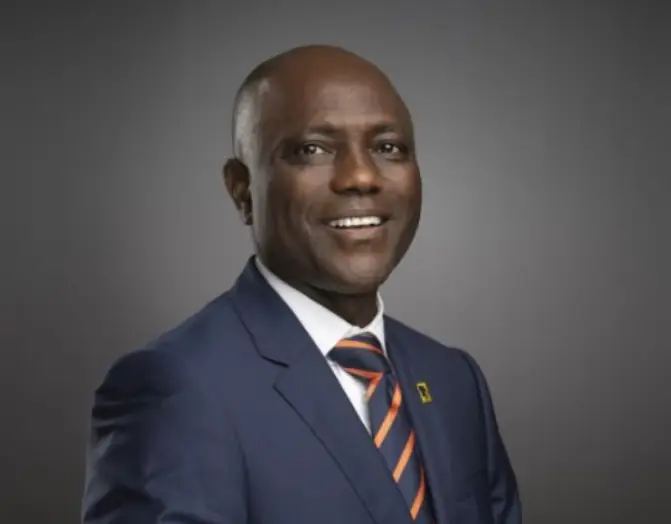
Olusegun Alebiosu has been appointed as the Acting Managing Director/Chief Executive Officer of First Bank of Nigeria Limited (FirstBank Group), effective April 2024.
Alebiosu steps into this pivotal role from his previous position as the Executive Director, Chief Risk Officer, and Executive Compliance Officer, a position he held since January 2022.
Alebiosu brings to the helm of FirstBank over 28 years of extensive experience in the banking and financial services industry. His expertise spans various domains including credit risk management, financial planning and control, corporate and commercial banking, agriculture financing, oil and gas, transportation, and project financing.
READ ALSO: JUST IN: Access Holdings Names New Acting CEO
Having embarked on his professional journey in 1991 with Oceanic Bank Plc. (now EcoBank Plc.), Alebiosu has held several notable positions in esteemed financial institutions.
Prior to joining FirstBank in 2016, he served as Chief Risk Officer at Coronation Merchant Bank Limited, Chief Credit Risk Officer at the African Development Bank Group, and Group Head of Credit Policy & Deputy Chief Credit Risk Officer at United Bank for Africa Plc.
Alebiosu’s academic credentials further enrich his professional profile. He is an alumnus of the Harvard School of Government and holds a Bachelor’s degree in Industrial Relations and Personnel Management. Additionally, he obtained a Master’s degree in International Law and Diplomacy from the University of Lagos, as well as a Master’s degree in Development Studies from the London School of Economics and Political Science.
READ ALSO: Meet Newly Appointed Union Bank CEO
A distinguished member of various professional bodies, including the Institute of Chartered Accountants (FCA), Nigeria Institute of Management (ANIM), and Chartered Institute of Bankers of Nigeria (CIBN), Alebiosu is renowned for his commitment to excellence and ethical practices in the banking sector.
Beyond his professional endeavors, Alebiosu is known for his passion for golf and adventure. He is happily married and a proud parent.
With Alebiosu’s appointment, FirstBank of Nigeria Limited anticipates continued growth and innovation under his leadership, reinforcing its position as a leading financial institution in Nigeria and beyond.
Business
CBN Gives New Directive On Lending In Real Estate
Published
2 weeks agoon
April 17, 2024By
Editor
The Central Bank of Nigeria, CBN, has released a new regulatory directive to enhance lending to the real sector of the Nigerian economy.
The directive, issued on April 17, 2024, with reference number BSD/DIR/PUB/LAB/017/005 and signed by the Acting Director of Banking Supervision, Adetona Adedeji, signifies a notable shift in the bank’s policy towards a more contractionary approach.
In line with the new measures, the CBN has reduced the loan-to-deposit ratio by 15 percentage points, down to 50 per cent.
This move aligns with the CBN’s current monetary tightening policies and reflects the increase in the Cash Reserve ratio rate for banks.
READ ALSO: JUST IN: CBN Gov Sacks Eight Directors, 32 Others
The LDR is a metric used to evaluate a bank’s liquidity by comparing its total loans to its total deposits over the same period, expressed as a percentage.
An excessively high ratio may indicate insufficient liquidity to meet unexpected fund requirements.
All Deposit Money Banks are now mandated to adhere to this revised LDR.
The CBN has stated that average daily figures will be utilised to gauge compliance with this directive.
Furthermore, while DMBs are encouraged to maintain robust risk management practices in their lending activities, the CBN has committed to continuous monitoring of adherence and will adjust the LDR as necessary based on market developments.
READ ALSO: JUST IN: CBN Increases Interest Rate To 24.75%
Adedeji has called on all banks to acknowledge these modifications and adjust their operations accordingly. He emphasised that this regulatory adjustment is anticipated to significantly influence the banking sector and the wider Nigerian economy.
The circular read in part, “Following a shift in the Bank’s policy stance towards a more contractionary approach, it is crucial to revise the loan-to-deposit ratio policy to conform with the CBN’s ongoing monetary tightening.
“Consequently, the CBN has decided to decrease the LDR by 15 percentage points to 50 per cent, proportionate to the rise in the CRR rate for banks.
“All DMBs must maintain this level, and it is advised that average daily figures will still be applied for compliance assessment.
“While DMBs are urged to sustain strong risk management practices concerning their lending operations, the CBN will persist in monitoring compliance, reviewing market developments, and making necessary adjustments to the LDR. Please be guided accordingly.”

GMOs: HOMEF Trains Gelegele Farmers, Urges Them To Embrace Agroecology

[JUST IN] Akpata: UNIBEN Suspends Students’ Union

Ooni: Suspended Benin Palace Functionaries Banished
Trending

 News5 days ago
News5 days agoEdo: FRSC Threatens Sanction On Truck Drivers Loading Goods, Passengers Together

 Headline4 days ago
Headline4 days agoSaudi Arabia Opens First Alcohol Store, Nigerian Muslims React

 Headline4 days ago
Headline4 days agoVIDEO: Meet Nigerian Pastor Who Predicted World Will End April 25

 News4 days ago
News4 days ago243 Passengers Cheat Death As Air Peace Plane Makes Emergency Landing At Lagos Airport

 Metro5 days ago
Metro5 days agoJUST IN: Four-year-old Boy Dies In Abuja School, Parents Suspect Foul Play

 Metro5 days ago
Metro5 days agoJUST IN: Protesters Storm APC Secretariat, Demand Ganduje’s Resignation

 News4 days ago
News4 days agoDSTV Price Hike: Five Alternatives Nigerians Are Opting For

 Politics4 days ago
Politics4 days agoEdo Guber: PDP Unveils 200-member Campaign Council

 News5 days ago
News5 days agoJUST IN: Senator Ayogu Eze Is Dead

 News5 days ago
News5 days agoEFCC Withdraws Appeal Against Former Kogi Gov, Bello
